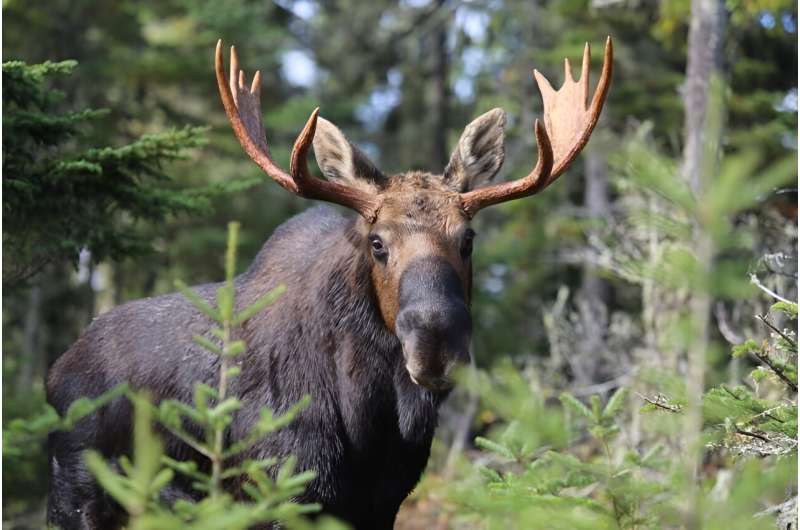This article has been reviewed according to Science X's editorial process and policies. Editors have highlighted the following attributes while ensuring the content's credibility:
fact-checked
peer-reviewed publication
trusted source
proofread
Study sheds light on the decline of Minnesota's moose population

Minnesota saw a 58% decline of the moose population in the northeastern part of the state between 2006 and 2017. A primary driver of the decline is brainworm, a parasite that affects the animal's nervous system ultimately leading to paralysis and death.
Researchers from the University of Minnesota and the Grand Portage Band of Lake Superior Chippewa recently discovered evidence that moose in Minnesota consume species of gastropods—slugs and snails—which are known hosts for the brainworm parasite (Parelaphostrongylus tenuis).
Although consumption of gastropods has long been considered the mode by which moose become infected with brainworm, this is the first study to empirically document this interaction in a natural setting.
In the study published in the Journal of Wildlife Diseases, Tiffany Wolf, a professor in the College of Veterinary Medicine, and Seth Moore, director of biology and environment for the Grand Portage Band of Lake Superior Chippewa, analyzed 258 fecal samples collected on and around Grand Portage tribal lands from moose and deer to detect their consumption of gastropods.
The team identified moose consumption of three species of gastropods. Of those three, one is a well-documented host for brainworm, while the other two have not been adequately investigated for their ability to host the parasite.
"Because this work is done in partnership with the Grand Portage Band, for whom moose are an important subsistence species and source of cultural preservation, a primary motivation of our research is maintaining healthy moose populations on and near the Grand Portage Indian Reservation," said Tyler Garwood, a researcher in the College of Veterinary Medicine who was part of the study.
"More broadly, moose are an iconic species for our state and fill an important ecological niche as the largest herbivore in the northwoods ecosystem."
Insight about which gastropod species moose are eating, the ability of those species to transmit disease, and their ecology can be used by forest and wildlife managers to design habitat modifications or other interventions that reduce the density of those gastropods in areas commonly used by moose.
Although such actions alone may not prevent local extinction of moose, it would give managers another tool in a currently limited toolbox to understand P. tenuis transmission, along with a new framework for designing effective interventions to mitigate and manage disease spread.
"The Grand Portage Band of Chippewa has been leading extensive efforts to restore moose in Minnesota for nearly 18 years to support the vital lifeways of the Anishinaabe," said Moore.
Gastropod-borne diseases are a major threat to human and animal health worldwide but are rarely understood. The techniques presented in this paper offer the potential to better understand a variety of gastropod-borne diseases, clearly identify the mechanism by which moose become infected with brainworm, and allow for applications in forest management that may reduce the transmission risk of brainworm to moose.
More information: Tyler J Garwood et al, Species in The Feces: DNA Metabarcoding to Detect Potential Gastropod Hosts of Parelaphostrongylus Tenuis Consumed by Moose (Alces alces). Journal of Wildlife Diseases. DOI: 10.7589/JWD-D-22-00120. meridian.allenpress.com/jwd/ar … WD-D-22-00120/494789
Journal information: Journal of Wildlife Diseases
Provided by University of Minnesota
















